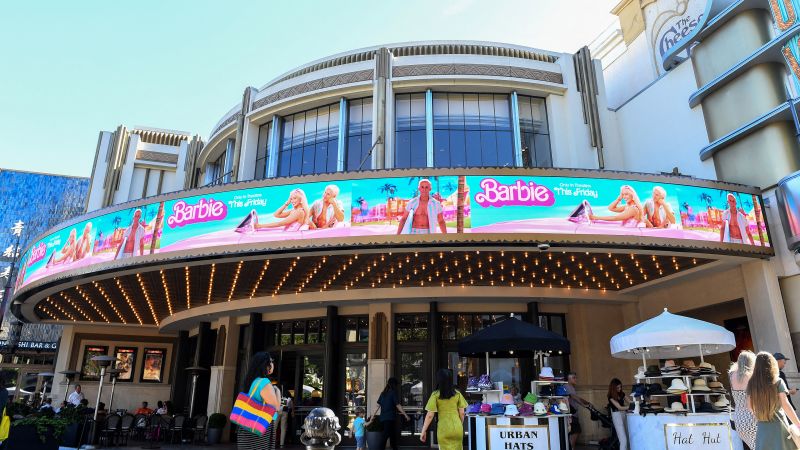Blockbuster hit “Barbie” brought in a record $1.5 billion for Warner Bros. Discovery, but the company still reported a $417 million loss for the quarter that was bigger than Wall Street’s forecasts.
The company, however, reported a narrow profit when taking into account adjustments for certain items, including interest, taxes, depreciation and amortization.
Warner Bros. Discovery, the parent company of CNN, needed the revenue boost from “Barbie” to achieve a narrow 2% increase in sales. The company’s revenue came in at just under $2 billion for the quarter.
The strong box office showing offset a $235 million drop in advertising revenue in WBD’s networks unit, representing a 12% drop. The company also contended with an unspecified drop in revenue that it attributed to the strikes held by the Writers Guild of America and SAG-AFTRA, the union representing 160,000 actors that halted most television and movie production for months. Although the writers strike has been settled, SAG-AFTRA remains on strike and negotiations between the union and studios and streaming services continues.
The company said in September it expected a hit to earnings of up to $500 million for the full year from the strike. CFO Gunnar Wiedenfels warned investors Wednesday that “there is a real risk at this point that some negative financial impact of the strike will extend into 2024 to some extent.” There is also a “possibility of continued sluggish advertising trends” into 2024, he said.
CEO David Zaslav said the strike had “compelled us to delay some releases” and gave the company “one of our lightest original content schedules in years” in the third quarter. But the company did not give any updated dollar estimates for the cost of the strike to the company.
“This is anything but a precise science,” said Wiedenfels.
“We are hopeful we will reach a resolution to the SAG-AFTRA strike soon,” said Zaslav, in a call with investors. “We recognize that we need our creative partners to feel valued and rewarded, and look forward to both sides getting back to the business of telling great stories.”
The company’s net loss marked an improvement from the $2.3 billion loss it reported in the same quarter a year earlier. But its loss per share of 17 cents was larger than the forecast of a 6-cent-a-share loss expected by analysts surveyed by Refinitiv.
The company reported that adjusted earnings before interest, taxes, depreciation and amortization (EBITDA) increased 22% to just under $3 billion. That measure of profits fell at both its networks and studio units, despite the strong box office from “Barbie.”
But WBD reported another profitable quarter from its streaming services, as adjusted EBITDA swung to a $111 million profit from a $634 million loss on that basis a year ago. It reported that profit despite a 700,000 decrease in the number of subscribers compared to a year earlier, to 95.1 million worldwide. Higher subscription prices and a 29% increase in advertising revenue helped turn around results.
The company had reported its first profit from streaming in the first quarter of this year, then fell back to a narrow loss from the unit in the second quarter. While Netflix is profitable, most of the streaming services operated by legacy media companies or Apple have yet to report a consistent profit.
WBD shares fell by close to 16% in morning trading on the earnings miss and the warning about continued impact of the strike and a sluggish ad market in 2024.
Read the full article here











Leave a Reply